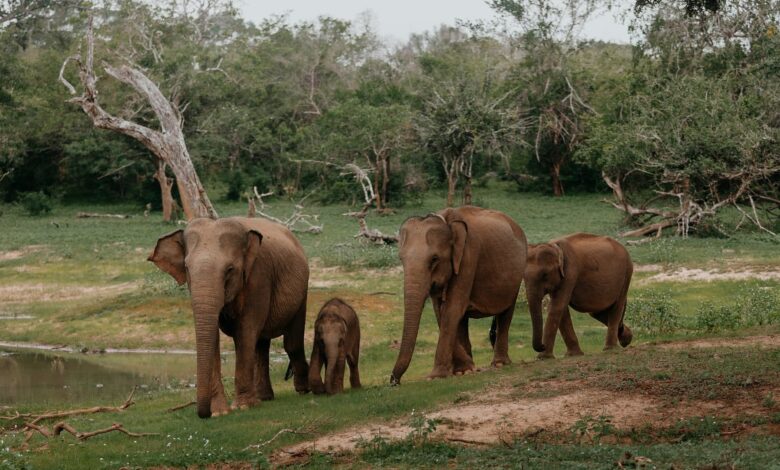Finest Nationwide Parks for Wildlife Safaris in Sri Lanka

Sri Lanka presents a wealth of thrilling wildlife safaris, the place you may watch elephants and birds in their natural habitats, capture unforgettable images, and expertise the nice and cozy hospitality of the island’s numerous people and cultures. A go-to right here guarantees to be a really memorable journey.
The nation is home to quite a few nationwide parks, nature reserves, safari lodges, and camps ready to be explored. Managed by the Division of Wildlife Conservation, Sri Lanka currently has 29 nationwide parks. Of those, 10 cowl areas are bigger than 100 sq. kilometers, whereas the other 14 exceed 50 sq. kilometers. The smallest, Lahugala-Kitulana Nationwide Park, nonetheless, supplies an important sanctuary for iconic species such as leopards, sloth bears, and elephants.
Most parks—apart from Flood Plains—are open to the general public for jeep safari excursions. Lodging is on the market in all 14 of the bigger parks, with choices starting from bungalows to tenting websites, or a mixture of both. Nonetheless, in a single day, stays could be comparatively costly as a result of charges set by the Wildlife Division.
Associated learn: Easy methods to See Leopards in Sri Lanka within the Wild
Right here’s your information on the perfect nationwide parks for wildlife safaris in Sri Lanka.
Discover Sri Lanka’s Nationwide Parks with CeylonTravel Dream
CeylonTravel Dream presents expertly guided excursions to all of Sri Lanka’s iconic nationwide parks, together with Yala, Wilpattu, Udawalawe, Minneriya, Bundala, Gal Oya, Kumana, and extra. Every tour is totally customizable, permitting you to create the right wildlife journey primarily based in your pursuits, journey fashion, and schedule.
A few of their hottest excursions embody:
➡ Birding Sanctuary & Wild Safari Tour – 36 days, from $2,900
➡ Exploring Leopards with Tenting – 10 days, from $1,900
➡ Sri Lanka Wildlife Safari Tour – 13 days, from $990

Finest Nationwide Parks for Wildlife Safaris in Sri Lanka
Yala Nationwide Park
Sri Lanka is blessed with breathtaking pure magnificence and among the world’s most exceptional wildlife. Amongst its many treasures, Yala Nationwide Park stands out as one of many nation’s premier locations for nature and wildlife fans. As Sri Lanka’s second-largest nationwide park, Yala is a real supply of nationwide pleasure and a sanctuary for numerous species.
Efforts to guard Yala’s numerous wildlife have helped protect its most iconic residents—majestic leopards, tusker elephants, and a blinding array of chook species, notably waterbirds that glide gracefully throughout the park’s wetlands.
Protecting a powerful 979 sq. kilometers, Yala lies about 300 kilometers from Colombo within the Southern and Uva Provinces. The park’s landscapes are splendidly different, with freshwater and marine wetlands, scrublands, and luxurious monsoon forests. It’s home to 215 chook species and 44 mammals, and it boasts one of many highest leopard densities on the planet. Reptiles, amphibians, and freshwater fish additionally thrive in this wealthy ecosystem.
Yala sits amongst a number of different famous parks, together with Bundala, Udawalawe, and Lunugamvehera. Inside its borders are two necessary pilgrimage websites, Sithulpahuwa and Magul Vihara, including cultural significance due to their pure wonders.
The park is split into 5 distinct blocks, with 4 entrance factors open to guests. Of those, the Palatupana entrance to Block 1 is by far the most well-liked, making it the gateway to unforgettable safari adventures.
Associated learn: Finest Day Journeys From Colombo

Wilpattu Nationwide Park
Wilpattu Nationwide Park is Sri Lanka’s oldest and largest nationwide park, celebrated as among the finest locations on the planet to see the Sri Lankan leopard in the wild. It’s a huge wilderness sheltering an unimaginable number of wildlife, together with 30 species of mammals such as the mighty Sri Lankan elephant, the elusive leopard, the endangered sloth bear, and the sleek noticed deer.
The park is especially well-known for offering uncommon alternatives to identify each leopard and sloth bear in their natural habitats. With fewer than 1,000 people left within the wild, the Sri Lankan sloth bear is taken into account endangered, making a sighting right here particularly significant.
Wilpattu can also be identified by its distinctive “Villus”—pure lakes scattered all through the park. These wetlands are very important for sustaining each resident and migratory waterbirds, contributing to the park’s rich biodiversity and distinct landscape.
One of the best ways to discover Wilpattu’s rugged magnificence is on a 4WD open-top safari, the place skilled guides can lead you to the park’s most wildlife-rich areas. A go to to Wilpattu guarantees an unforgettable journey into one of Sri Lanka’s most pristine wildernesses.

Udawalawe Nationwide Park
Udawalawe Nationwide Park, the third most visited park in Sri Lanka, is a favourite amongst both locals and vacationers. Situated close to Yala Nationwide Park, it was initially established to supply a sanctuary for wildlife displaced by the development of the Udawalawe Reservoir on the Walawe River.
Protecting 308 sq. kilometers, Udawalawe was formally declared a nationwide park on 30 June 1972. Located about 165 km from Colombo, it’s best identified for its thriving population of Sri Lankan elephants and its abundance of water birds.
The park’s open grasslands and scrub jungles support a wide range of wildlife, making it a wonderful place to identify not just elephants and birds, but also reptiles, fish, and different wildlife. For guests in search of a close-up expertise with Sri Lanka’s mild giants in their natural habitat, Udawalawe is a must-visit destination.

Bundala Nationwide Park
Bundala Nationwide Park is known for the spectacular flocks of flamingos that migrate via the park every year. This coastal sanctuary is wealthy in biodiversity, home to waterfowl, massive water birds, Asian elephants, leopards, wild boar, and sleek noticed deer.
Acknowledged internationally as a significant wintering floor for migratory waterbirds, Bundala is very beloved by birdwatchers. Protecting 14.28 sq. kilometers, it was formally declared a nationwide park in January 1993.
Situated about 245 km southeast of Colombo, Bundala attracts guests from worldwide desirous to witness its distinctive landscapes and unimaginable birdlife. For anybody obsessed with wildlife images or birdwatching, this park is an unmissable cease in Sri Lanka.

Kumana Nationwide Park
Kumana Nationwide Park, positioned in southeastern Sri Lanka, covers 18,149 hectares and is without doubt one of the nation’s premier eco-tourism locations. Well-known as a chook sanctuary, it’s particularly famous for its wide range of birdlife.
The park’s defining characteristic is Kumana Villu, a 200-hectare pure swamp lake fed by the Kumukkan Oya via a slim half-mile channel. Annually, throughout May and June, the swamp turns into a bustling nesting floor for hundreds of water birds, together with spoonbills, pelicans, and white ibis. Birdwatchers may be fortunate sufficient to identify the uncommon black-necked stork.
Along with its avian residents, Kumana is home to a number of mammals additionally present in close by Yala Nationwide Park, resembling elephants and leopards. Its panorama options mangroves, kumbuk, and karan bushes, interspersed with open marshlands.
For anybody obsessed with birdwatching or nature images, Kumana Nationwide Park is an absolute must-visit in Sri Lanka.

Minneriya Nationwide Park
Minneriya Nationwide Park, also called Minneriya Safari Park, is one of Sri Lanka’s hottest wildlife locations for both families and travel seekers. Protecting 8,890 hectares, the park consists of the previous Minneriya-Girale Sanctuary, components of the Minneriya-Giritale Nature Reserve, and the Sigiriya Sanctuary. Situated in Polonnaruwa District within the heart of the island’s Cultural Triangle, Minneriya is world-famous for “The Gathering”—a wide-ranging spectacle the place a whole bunch of untamed elephants congregate across the Minneriya Tank through the dry season. It’s broadly considered one of Asia’s most unforgettable wildlife experiences.
Acknowledged as one of Sri Lanka’s 70 Essential Chicken Areas (IBAs), Minneriya can also be a haven for birdwatchers. Through the dry season, elephants from the Matale, Polonnaruwa, and Trincomalee districts migrate right here, making it the right time for shut encounters with these mild giants.
Ecologists contemplate Minneriya a significant part of Sri Lanka’s dry-zone ecosystem, taking part in a key function within the long-term conservation of elephants and different displaced wildlife. The park is surrounded by a number of different protected areas—together with Wasgomuwa, Kaudulla, Somawathiya, and Flood Plains Nationwide Parks—creating an unlimited, interconnected habitat for wildlife.
Simply accessible by way of the Habarana–Polonnaruwa freeway, Minneriya guarantees a rare safari experience and an opportunity to witness one of nature’s most awe-inspiring occasions.

Gal Oya Nationwide Park
No Sri Lankan safari is complete without spending time observing the majestic Asian elephant in its pure habitat. Think about being surrounded by the park’s breathtaking wilderness when, immediately, an elephant emerges quietly from the bushes. It strolls to the water’s edge, lowers its trunk for a drink, and playfully splashes the water—an easy but highly effective reminder of nature’s resilience and style. Moments like these stick with you without end.
Gal Oya Nationwide Park is very well-known for its elephants, referred to as among the finest swimmers amongst all mammals. These mild giants effortlessly traverse the park’s lush, inexperienced islands, creating some of the distinctive wildlife spectacles in Sri Lanka. Watching a large elephant swim gracefully from one island to a different is an experience that words can hardly capture.
Regardless of their immense size, Gal Oya’s elephants radiate a quiet tranquility. Seeing them emerge from the water—towering and highly effective—is unforgettable. This can be a place the place you don’t simply observe nature; you’re feeling deeply linked to it.
Let Gal Oya reveal its wonders to you—embrace the journey, witness the extraordinary, and uncover your house within the wild.

When Is the Finest Time to Go to Sri Lanka’s Nationwide Parks?
The finest time to go to most of Sri Lanka’s nationwide parks is between April and August, when wildlife sightings are plentiful and visitor numbers are usually decreased, making for a extra peaceful safari experience.
Sri Lanka’s local weather is formed by two monsoon seasons that arrive from opposite directions at totally different times of the year. Due to this distinctive climate sample, at the very least half of the nation is normally appropriate for journey at any given time, and most nationwide parks stay open year-round (with solely transient seasonal closures in some circumstances).
Common daytime temperatures sit within the mid-20s°C, often reaching as much as 35°C. The humidity could make it really feel hotter, however, guests can all the time discover relief within the cooler hill country or alongside breezy coastal areas.
The southwest monsoon brings rain to the south, west, and central highlands from May to July, whereas the northeast monsoon impacts the north and east from October to January. The dry season sometimes falls between December and March within the southwest and May to September within the northeast. Even within the so-called “dry” months, transient showers are frequent; however, sunny days are by no means far behind.
Associated learn: High Locations to Go to in Sri Lanka

Featured Tour: Sri Lanka Wildlife Safari Tour (13 Days)
Embark on an unforgettable 13-day wildlife safari throughout Sri Lanka’s most iconic and biodiverse places, the place lush rainforests meet huge national parks and pristine coastlines. This journey is ideal for nature lovers and wildlife fans, providing up-close encounters with the island’s distinctive wildlife in their pure habitats.
From misty rainforests and tropical jungles to sprawling savannas and dolphin-filled waters, every day guarantees a brand new journey and a deeper connection to Sri Lanka’s extraordinary wilderness. This immersive tour combines thrilling jeep safaris, nature walks, and unforgettable wildlife experiences, showcasing the nation’s wealthy ecosystems—from rainforests and savannas to serene seashores and vibrant marine life.
Journey Highlights
- Sinharaja Rainforest – Trek via Sri Lanka’s UNESCO-listed rainforest, residence to endemic birds, unique crops, and considerable wildlife.
- Yala Nationwide Park – Expertise thrilling jeep safaris within the park with the world’s highest leopard density, together with elephants, sloth bears, and numerous birdlife.
- Udawalawe Nationwide Park – Uncover among the finest locations in Asia to see wild elephants, with its huge herds and scenic landscapes.
- Kitulgala & Makandawa Rainforest – Immerse your self in lush rainforest environment, excellent for birdwatching and nature walks alongside the Kelani River.
- Habarana – Discover tranquil lakes and spot elephants and different wildlife on this lovely a part of Sri Lanka’s Cultural Triangle.
- Kalpitiya Dolphin Watching – Witness playful spinner dolphins in pristine coastal waters, including a marine contact to your wildlife journey.
- Negombo – Finish your journey by enjoyable on scenic seashores and exploring historic Dutch canals.
Itinerary Overview
Day 1: Arrival in Colombo
Day 2–3: Discover Sinharaja Rainforest
Day 4: Journey to Yala Nationwide Park
Day 5: Full-day safari in Yala
Day 6: Switch to Udawalawe Nationwide Park
Day 7: Journey to Kitulgala
Day 8: Uncover Makandawa Rainforest
Day 9: Switch to Habarana
Day 10: Journey to Kalpitiya
Day 11: Dolphin watching in Kalpitiya
Day 12: Switch to Negombo
Day 13: Departure from Colombo
Value: From $990 per grownup
Able to plan your dream safari? CeylonTravel Dream can customise this itinerary—or create a completely new one—primarily based on your preferences for locations, wildlife experiences, and tempo of journey.
READ MORE: LAD REPORTING




